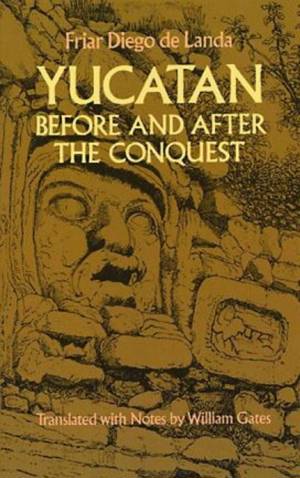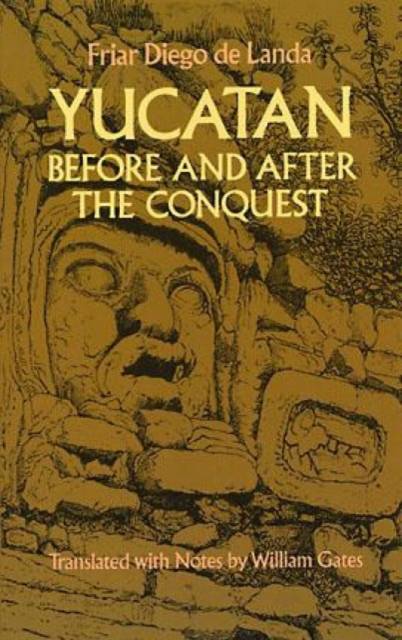
Bedankt voor het vertrouwen het afgelopen jaar! Om jou te bedanken bieden we GRATIS verzending aan op alles gedurende de hele maand januari.
- Afhalen na 1 uur in een winkel met voorraad
- Gratis thuislevering in België
- Ruim aanbod met 7 miljoen producten
Bedankt voor het vertrouwen het afgelopen jaar! Om jou te bedanken bieden we GRATIS verzending aan op alles gedurende de hele maand januari.
- Afhalen na 1 uur in een winkel met voorraad
- Gratis thuislevering in België
- Ruim aanbod met 7 miljoen producten
Zoeken
€ 12,95
+ 25 punten
Omschrijving
These people also used certain characters or letters, with which they wrote in their books about the antiquities and their sciences. We found a great number of books in these letters and since they contained nothing but superstitions and falsehoods of the devil we burned them all, which they took most grievously, and which gave them great pain.
So writes Friar Diego de Landa in his Relación De las cosas de Yucatan of 1566, the basic book in Maya studies. Landa did all he could to wipe out Maya culture and civilization. In the famous auto da fé of July 1562 at Maní, as he tells us, he destroyed 5,000 "idols" and burned 27 hieroglyphic rolls. And yet paradoxically Landa's book, written in Spain to defend himself against charges of despotic mismanagement, is the only significant account of Yucatan done in the early post-Conquest era. As the distinguished Maya scholar William Gates states in his introduction, "ninety-nine percent of what we today know of the Mayas, we know as the result either of what Landa has told us in the pages that follow, or have learned in the use and study of what he told." Yucatan Before and After the Conquest is the first English translation of this very important work.
Landa's book gives us a full account of Maya customs, daily activities, history, ceremonial festivals, and the many social and communal functions in which their life was expressed. Included here are the geography and natural history of Yucatan, the history of the Conquest, indigenous architecture and other aspects of Maya civilization (sciences, books, religion, etc.), native historical traditions, the Inquisition instituted by the Spanish clergy, Maya clothing, food, commerce, agriculture, human sacrifices, calendrical lore, and much more.
So writes Friar Diego de Landa in his Relación De las cosas de Yucatan of 1566, the basic book in Maya studies. Landa did all he could to wipe out Maya culture and civilization. In the famous auto da fé of July 1562 at Maní, as he tells us, he destroyed 5,000 "idols" and burned 27 hieroglyphic rolls. And yet paradoxically Landa's book, written in Spain to defend himself against charges of despotic mismanagement, is the only significant account of Yucatan done in the early post-Conquest era. As the distinguished Maya scholar William Gates states in his introduction, "ninety-nine percent of what we today know of the Mayas, we know as the result either of what Landa has told us in the pages that follow, or have learned in the use and study of what he told." Yucatan Before and After the Conquest is the first English translation of this very important work.
Landa's book gives us a full account of Maya customs, daily activities, history, ceremonial festivals, and the many social and communal functions in which their life was expressed. Included here are the geography and natural history of Yucatan, the history of the Conquest, indigenous architecture and other aspects of Maya civilization (sciences, books, religion, etc.), native historical traditions, the Inquisition instituted by the Spanish clergy, Maya clothing, food, commerce, agriculture, human sacrifices, calendrical lore, and much more.
Specificaties
Betrokkenen
- Auteur(s):
- Uitgeverij:
Inhoud
- Aantal bladzijden:
- 192
- Taal:
- Engels
- Reeks:
Eigenschappen
- Productcode (EAN):
- 9780486236223
- Verschijningsdatum:
- 16/05/2012
- Uitvoering:
- Paperback
- Formaat:
- Trade paperback (VS)
- Afmetingen:
- 137 mm x 216 mm
- Gewicht:
- 204 g

Alleen bij Standaard Boekhandel
+ 25 punten op je klantenkaart van Standaard Boekhandel
Beoordelingen
We publiceren alleen reviews die voldoen aan de voorwaarden voor reviews. Bekijk onze voorwaarden voor reviews.












